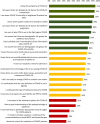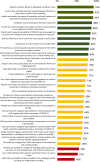Healthworker preparedness for COVID-19 management and implementation experiences: a mixed methods study in Uganda's refugee-hosting districts
- PMID: 34732235
- PMCID: PMC8564594
- DOI: 10.1186/s13031-021-00415-z
Healthworker preparedness for COVID-19 management and implementation experiences: a mixed methods study in Uganda's refugee-hosting districts
Abstract
Background: The negative impact of COVID-19 on population health outcomes raises critical questions on health system preparedness and resilience, especially in resource-limited settings. This study examined healthworker preparedness for COVID-19 management and implementation experiences in Uganda's refugee-hosting districts.
Methods: A cross sectional, mixed-method descriptive study in 17 health facilities in 7 districts from 4 major regions. Total sample size was 485 including > 370 health care workers (HCWs). HCW knowledge, attitude and practices (KAP) was assessed by using a pre-validated questionnaire. The quantitative data was processed and analysed using SPSS 26, and statistical significance assumed at p < 0.05 for all statistical tests. Bloom's cutoff of 80% was used to determine threshold for sufficient knowledge level and practices with scores classified as high (80.0-100.0%), average (60.0-79.0%) and low (≤ 59.0%). HCW implementation experiences and key stakeholder opinions were further explored qualitatively using interviews which were audio-recorded, coded and thematically analysed.
Results: On average 71% of HCWs were knowledgeable on the various aspects of COVID-19, although there is a wide variation in knowledge. Awareness of symptoms ranked highest among 95% (p value < 0.0001) of HCWs while awareness of the criteria for intubation for COVID-19 patients ranked lowest with only 35% (p value < 0.0001). Variations were noted on falsehoods about COVID-19 causes, prevention and treatment across Central (p value < 0.0356) and West Nile (p value < 0.0161) regions. Protective practices include adequate ventilation, virtual meetings and HCW training. Deficient practices were around psychosocial and lifestyle support, remote working and contingency plans for HCW safety. The work environment has immensely changed with increased demands on the amount of work, skills and variation in nature of work. HCWs reported moderate control over their work environment but with a high level of support from supervisors (88%) and colleagues (93%).
Conclusions: HCWs preparedness is inadequate in some aspects. Implementation of healthcare interventions is constrained by the complexity of Uganda's health system design, top-down approach of the national response to COVID-19 and longstanding health system bottlenecks. We recommend continuous information sharing on COVID-19, a design review with capacity strengthening at all health facility levels and investing in community-facing strategies.
Keywords: COVID-19; Health care workers (HCWs); Health system; KAP; Preparedness; Resilience.
© 2021. The Author(s).
Conflict of interest statement
We have no competing interests.
Figures
Similar articles
-
Healthcare Workers' Knowledge, Attitude, Practice and Perceived Health Facility Preparedness Regarding COVID-19 in Sierra Leone.J Multidiscip Healthc. 2021 Jan 11;14:67-80. doi: 10.2147/JMDH.S287156. eCollection 2021. J Multidiscip Healthc. 2021. PMID: 33469299 Free PMC article.
-
Healthcare workers' experiences with COVID-19-related prevention and control measures in Tanzania.PLOS Glob Public Health. 2023 Dec 5;3(12):e0002678. doi: 10.1371/journal.pgph.0002678. eCollection 2023. PLOS Glob Public Health. 2023. PMID: 38051721 Free PMC article.
-
Healthcare workers' knowledge, preparedness, counselling practices, and perceived barriers to confront COVID-19: A cross-sectional study from a war-torn country, Yemen.PLoS One. 2020 Dec 11;15(12):e0243962. doi: 10.1371/journal.pone.0243962. eCollection 2020. PLoS One. 2020. PMID: 33306750 Free PMC article. Clinical Trial.
-
COVID-19: a National Survey on perceived level of knowledge, attitude and practice among frontline healthcare Workers in Nepal.BMC Public Health. 2020 Dec 14;20(1):1905. doi: 10.1186/s12889-020-10025-8. BMC Public Health. 2020. PMID: 33317486 Free PMC article.
-
Knowledge, Attitudes, and Practices Regarding COVID-19 Among Health Care Workers in Public Health Facilities in Eastern Ethiopia: Cross-sectional Survey Study.JMIR Form Res. 2021 Oct 1;5(10):e26980. doi: 10.2196/26980. JMIR Form Res. 2021. PMID: 34477559 Free PMC article.
Cited by
-
Effects of COVID-19, control measures, and program adaptation on prevention of mother-to-child HIV transmission service uptake in Central Region, Uganda.BMC Public Health. 2024 Nov 12;24(1):3142. doi: 10.1186/s12889-024-20610-w. BMC Public Health. 2024. PMID: 39533238 Free PMC article.
-
Building a resilient health system for universal health coverage and health security: a systematic review.Glob Health Res Policy. 2024 Jan 4;9(1):2. doi: 10.1186/s41256-023-00340-z. Glob Health Res Policy. 2024. PMID: 38173020 Free PMC article.
-
Factors influencing healthcare workers' and health system preparedness for the COVID-19 pandemic: A qualitative study in Ghana.PLOS Glob Public Health. 2024 Jul 30;4(7):e0003356. doi: 10.1371/journal.pgph.0003356. eCollection 2024. PLOS Glob Public Health. 2024. PMID: 39078814 Free PMC article.
-
Uptake and effectiveness of a mobile application for real-time reporting and quality assurance of decentralized SARS-CoV-2 testing in Uganda.Front Public Health. 2023 Jun 1;11:1053544. doi: 10.3389/fpubh.2023.1053544. eCollection 2023. Front Public Health. 2023. PMID: 37325307 Free PMC article.
-
Health workforce incentives and dis-incentives during the COVID-19 pandemic: experiences from Democratic Republic of Congo, Nigeria, Senegal, and Uganda.BMC Health Serv Res. 2024 Apr 3;24(1):422. doi: 10.1186/s12913-024-10822-6. BMC Health Serv Res. 2024. PMID: 38570839 Free PMC article.
References
-
- Nouri S. Effects of conflict, displacement, and migration on the health of refugee and conflict-stricken populations in the Middle East. Int J Public Health Sci. 2019;8(3):359–372. doi: 10.11591/ijphs.v8i3.18590. - DOI
-
- IHME COVID-19 health service utilization forecasting team, and Murray CJ. Forecasting the impact of the first wave of the COVID-19 pandemic on hospital demand and deaths for the USA and European Economic Area countries. medRxiv. 2020
-
- World Bank Group. An assessment of Uganda's progressive approach to refugee management. World Bank; 2016.
-
- Hattem J. Uganda at breaking point as Bidi Bidi becomes world’s largest refugee camp. The Guardian. 2017.
-
- UNHCR. Uganda: Refugees and asylum-seekers. UNHCR Representation in Uganda. 2017.
Grants and funding
LinkOut - more resources
Full Text Sources




